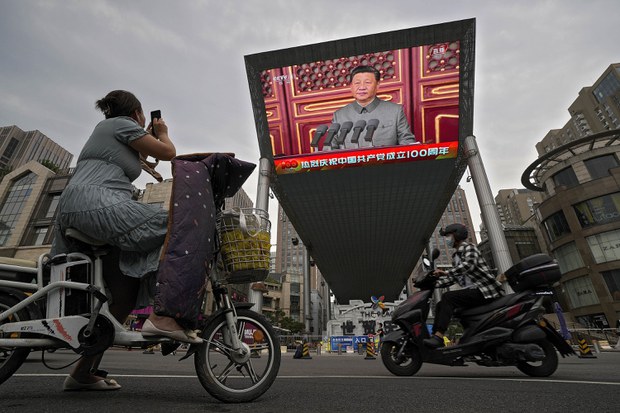China’s new cultural enforcers get into uniform
Share

A large video screen displays Chinese President Xi Jinping speaking during an event to commemorate the 100th anniversary of China’s Communist Party at Tiananmen Square in Beijing on July 1, 2021.
First came the chengguan, or Urban Management Law Enforcement Force, which aimed to bring order to the city streets of China. Then came the nongguan, the Agricultural Comprehensive Administrative Law Enforcement Force, which ripped up unapproved crops and brought order to the countryside.
Now China has the wenguan, or Cultural Management Law Enforcement Force.
Their purpose is to bring China’s cultural agencies and media into line with government policy and “Xi Jinping thought” – that of the country’s supreme leader.
In the northeastern province of Heilongjiang, the new cultural enforcers even have their own dark blue uniforms emblazoned with the Chinese characters for “cultural enforcement.”
More than 500 people attended the “uniform dressing ceremony” in Jiamusi city on May 30. He Jing, director of the Heilongjiang Provincial Department of Culture and Tourism, awarded flags to 13 municipal cultural market comprehensive enforcement teams in the province.
A Contentious Past
The nongguan have been a hot subject on Chinese social media due to videos of them attacking farming products as innocuous as ginger – a popular seasoning in Chinese cuisines – and other “non-essential” crops.
As recently as April this year RFA reported on nongguan uprooting “forbidden crops” in backyards and in fields China-wide in a move allegedly aimed at securing China’s staple food supplies.
As for the much feared chengguan, as early as 2012, a Human Rights Watch report was describing the urban enforcers as “thuggish” and arguing that their behavior was leading to public anger and undermining stability.
“Chengguan forces have earned a reputation for brutality and impunity,” said Sophie Richardson, China director at HRW, at the time.
The new Cultural Management Law Enforcement Force is responsible for cracking down on violations or frowned-upon, “uncivilized” behavior in the areas of culture, tourism, publishing, broadcasting, television and film.
Among their many assigned responsibilities they might, for example, track down and allocate punishments for writers on online literature platforms that spread pornography, violence, “feudal superstition” and other harmful content, although their role is wide and ambiguous.
Many netizens have taken to social media to challenge or mock the emergence of the “cultural enforcers” while also expressing fear they could create a cultural desert.
One netizen said in a video: “First it was urban management, then agricultural management, and now it’s cultural management. What even is cultural management? If they’re managing poisonous textbooks, OK, I applaud them, but … if it means my Internet company has to get in line for a chat …”
Managing culture
Cai Shengkun, a U.S.-based current affairs commentator, told RFA that China’s establishment of a cultural market comprehensive enforcement team is actually simply aimed at increasing political supervision.
“It’s mostly about political considerations,” he said. “They’re trying to comprehensively manage the cultural sphere – including cultural products … performing arts and entertainment.”
The plan to comprehensively manage the cultural sphere dates back to 2018, when the Central Committee of the Communist Party of China issued a plan to “integrate and form a comprehensive enforcement team for cultural markets,” including tourism market enforcement duties. The team is guided by the Ministry of Culture and Tourism.
A year later, cultural law enforcement teams were already at work, but they were far less active than their urban management and agricultural management equivalents.
“Someone from a news source told me that the Central Propaganda Department organized staff to go to North Korea to learn from its cultural management and maintain social stability,” said US-based Cai.
RFA was unable to verify that the Central Propaganda Department was cooperating with North Korea.
Zhang Jianping, a current affairs commentator from Yixing City in Jiangsu Province, told RFA that the concern was that China would lose its vitality if it focused too much on cultural management.
“There was no security problem or social stability problem in the past when culture was blooming,” Zhang said.
Edited by Malcolm Foster.







